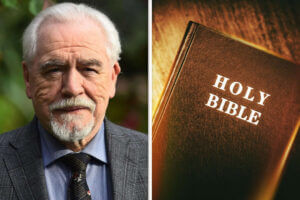Rasmussen’s article “The Gospel According to Michael Porter” in Institutional Investor explains the tension between value investors who emphasize institutional power and those who emphasize the numbers. The former is championed by Harvard’s Professor Michael Porter and the latter was championed by Benjamin Graham.
When most of today’s executives think of competitive advantage, they tend to think of Porter’s five forces: bargaining power of suppliers, bargaining power of buyers, rivalry among existing firms, threat of substitute products, and the threat of new entrants. According to Porter, the goal of strategy is to capture excess profits which arise from structure, and the five forces shape structure. In other words, higher market share allows businesses to capture greater profits from competitors, suppliers and customers. His ideas have changed business education. Goliath would have had a sustainable competitive advantage.
Benjamin Graham (1894-1976) is known as the father of value investing. He believed in making investment decisions based on a thoughtful analysis of the numbers—especially when his analysis differed from the current market consensus. Warren Buffet describes Graham’s book The Intelligent Investor as the “best book about investing ever written.” Graham had a successful career on Wall Street and taught at Columbia University and at UCLA. Graham would have been looking for underdogs, such as David, in whom to invest.
Rasmussen’s article centers around the question of “could his (Porter’s) investing ideas be wrong?” According to Rasmussen, Graham’s ideas have “endlessly been empirically proven.” But “Porter’s competitive strategy principles have no empirical foundation. There is simply no evidence—not a single quantitative study—to support his conclusion. Is it possible that the consensus view of competitive strategy, taught at every business school in the country, just isn’t right?” Maybe future research will answer this question.
In the kingdom, how much of the gospel taught today is biblical? Would first-century saints recognize the gospel declared today? Would ministers 100 years ago recognize it? Are we preaching a gospel which fits today’s culture, or one which will change the culture? Are we teaching the complete gospel or only select portions? The first-century church changed the world for the glory of God. We are still charged to change the world.
The Holy Spirit gave Paul insight into today’s culture. In his last letter to Timothy, Paul said that the last days would be perilous. Men would be self-absorbed, greedy, selfish, proud, blasphemers and would not respect authority. He saw that our culture would be unthankful, unholy, without natural affection, fierce, despisers of those that are good, traitors and conceited. He saw that the last-days people would love pleasure more than God, and that they would have a form of godliness but would deny its power. He charged Timothy to avoid these new cultural norms.
“Know this: In the last days perilous times will come. Men will be lovers of themselves, lovers of money, boastful, proud, blasphemers, disobedient to parents, unthankful, unholy, without natural affection, truce breakers, slanderers, unrestrained, fierce, despisers of those who are good, traitors, reckless, conceited, lovers of pleasures more than lovers of God, having a form of godliness, but denying its power. Turn away from such people” (2 Tim. 3:1-5).
Paul also taught that people would not want to endure sound doctrine. They would seek teachers who teach in accord with what they already believe. Could culturally sensitive, seeker-friendly, hyper-grace or prosperity messages be what Paul was talking about? The gospel is Good News. The Bible talks about reaching all, addressing our culture, abounding grace and prosperity, but overemphasis distorts. When truth is diminished, myths are often accepted.
“For the time will come when people will not endure sound doctrine, but they will gather to themselves teachers in accordance with their own desires, having itching ears, and they will turn their ears away from the truth and turn to myths” (2 Tim. 4:3-4).
Paul reminded Timothy that Scripture is inspired by God and that it is useful. Specifically, the Word is useful for reproof, correction and instruction so that believers will be complete and equipped for every good work. Lastly, Timothy was told to preach the Word of God. We should be ready at all times to reprove, rebuke, and exhort with all patience and teaching.
“All Scripture is inspired by God and is profitable for teaching, for reproof, for correction, and for instruction in righteousness, that the man of God may be complete, thoroughly equipped for every good work” (2 Tim. 3:16-17).
“I charge you therefore before God and the Lord Jesus Christ, who will judge the living and the dead at His appearing and His kingdom: Preach the word, be ready in season and out of season, reprove, rebuke, and exhort, with all patience and teaching” (2 Tim. 4:1-2).
At the beginning of 2 Timothy, Paul told his spiritual son to stir up his spiritual gift. Do we need to stir up our spiritual gifts? Timothy was reminded that he had been given the Spirit of God; a Spirit of power, a Spirit of love, and a Spirit of self-control. Do we fully recognize the empowerment that comes from having the Spirit of the everlasting God residing in us?
“Therefore I remind you to stir up the gift of God, which is in you by the laying on of my hands. For God has not given us the spirit of fear, but of power, and love, and self-control” (2 Tim. 1:6-7).
Our days may be filled with challenges, but we have the greatest opportunity in history to reach and change our world. Let us embrace the advice given Timothy. Let us embrace the Spirit and the Word.
“But you shall receive power when the Holy Spirit comes upon you. And you shall be My witnesses in Jerusalem, and in all Judea and Samaria, and to the ends of the earth” (Acts 1:8). {eoa}
Dr. James Russell is a professor of economics at Oral Roberts University.
See an error in this article?
To contact us or to submit an article






















